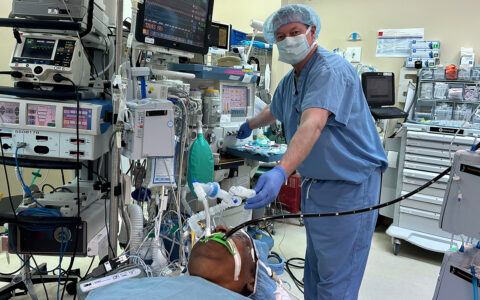African Americans with kidney disease experience a 3- to 5-fold higher risk of cardiovascular disease compared to Caucasians with kidney disease. The underlying reason is controversial, said Adriana Hung, M.D., a nephrologist and epidemiologist at Vanderbilt University Medical Center.
“Apolipoprotein 1 risk variants explain African Americans’ disproportionate burden of end stage renal disease. Whether the same variants also confer increased risk of cardiovascular disease is a field of study with mixed results.”
“Apolipoprotein 1 risk variants explain African Americans’ disproportionate burden of end stage renal disease. Whether the same variants also confer increased risk of cardiovascular disease is a field of study with mixed results,” Hung said.
Hung is principal investigator for a Million Veteran Program (MVP) grant investigating chronic kidney disease and hypertension genetics. She recently teamed up with researchers across the country¹ to put the power of the MVP database to work on the genetic etiology of increased cardiovascular disease risk among African Americans with kidney disease.
Increases and Decreases
Only recently have genome wide association studies revealed variants that underlie African Americans’ increased risk of kidney disease. Two high-risk variants have emerged in the gene encoding apolipoprotein 1 (apoL1), a component of high-density lipoprotein cholesterol.
Many studies have delved deeper, looking into cardiovascular risks associated with apoL1 variants. One found the variants doubled risk of cardiovascular disease among nearly 2,000 African Americans. Another found decidedly the opposite among a similar sample size.
Powering Up
In a study published in Circulation, Hung and colleagues pulled retrospective data from 30,903 African American participants in the MVP.
They excluded patients with kidney disease at baseline, then compared how each apoL1 variant influenced cardiovascular outcomes across a 12-year (mean) follow-up period. The researchers found only a modest increase in risk for coronary disease, stroke and peripheral artery disease among participants—and only for people with both high-risk apoL1 genotypes.
The study included a sample size three times larger than previous investigations, wrote the authors. “Many of the published studies lacked statistical power to detect what we find is an extremely modest increase in [risk].”
Understanding Risk
“ApoL1 does not represent a strong, independent risk factor for cardiovascular disease.”
“The results show apoL1 does not represent a strong, independent risk factor for cardiovascular disease,” Hung said. Even when the researchers modeled both cardiovascular and renal outcomes, they only found strong associations between apoL1 and incident renal disease, not cardiovascular disease.
Half (47 percent) of MVP participants in the study had only one apoL1 risk variant, while 13 percent had two. The study found one variant (the G1 missense mutation) was responsible for the small increase in cardiovascular risk more so than the other (G2 deletion mutation).
The variants have a differential effect, which likely contributed to conflicting results in previous studies that didn’t control for it, Hung says. The nuances of each variant also reinforce the importance of apoL1 screening to fully understand a person’s risk. Support for apoL1 screening varies in African American communities, and debates among policymakers about screening guidelines are ongoing.




